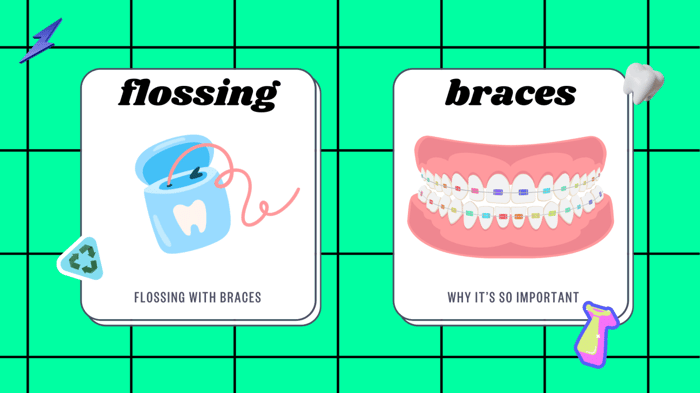Flossing is good for our gums and teeth, right? And that's it? We know - we use to view flossing as 'optional' or 'only done to avoid a toothache' too. But flossing is actually incredibly important for our overall health - especially for people affected by diabetes. So what is the link between flossing and diabetes?
Regular removal of plaque and food particles lodged between teeth reduces the risk of gum disease, which is especially important for individuals with diabetes, as those affected tend to have a lowered ability to fight off bacteria. Regular flossing also has another surprising benefit that is particularly meaningful to those with diabetes - better control of blood sugar levels.
How you ask? Great question - good oral hygiene helps to reduce gum disease, and not having gum disease, links directly to more balanced blood sugar levels! Now, let's delve into this connection between flossing and diabetes a bit deeper.
Flossing is crucial for individuals with diabetes as it helps prevent gum disease, which can be more prevalent in those with diabetes. Proper oral hygiene, including regular flossing, can contribute to better blood sugar control and overall systemic health for individuals managing diabetes. It's essential to consult with a dental professional to develop a personalized oral care routine that complements your diabetes management plan.
Flossing and Diabetes: Unveiling the Connection
Individuals with diabetes face a unique set of challenges, particularly when it comes to their oral health. The increased levels of glucose in the bloodstream affect the body's ability to stave off bacterial infections and maintain optimal gum health. As a result, those with diabetes are at a heightened risk of developing gum disease, tooth decay, and other oral health issues. But why does diabetes have such a significant impact on oral health?
The connection ties back to the body's reduced ability to combat bacteria effectively due to elevated blood sugar levels. These high sugar levels provide an ideal environment for bacteria to thrive, leading to an increased risk of plaque build-up, gum infections, and other dental problems. For individuals with diabetes, this heightened susceptibility makes maintaining good oral hygiene practices even more crucial for overall well-being.
Picture this: just as plants grow better in fertile soil, harmful bacteria flourish in an environment abundant in sugar. In the case of individuals with diabetes, their bodies' higher glucose levels create an inviting space for bacteria in the mouth, making it essential to take proactive measures to counteract this increased risk.
This is where flossing steps in as a vital player in the fight against oral health issues associated with diabetes. By diligently removing plaque and food particles from between the teeth and along the gumline, flossing helps mitigate the risk of gum disease and tooth decay that individuals with diabetes are more susceptible to.
Regular flossing can significantly reduce the presence of harmful bacteria in the mouth, preventing it from causing damage to gum tissue and teeth over time. This simple yet effective practice helps manage potential oral health complications related to diabetes by maintaining a healthy environment within the mouth.
It's important to remember that maintaining good oral hygiene is a powerful ally in managing diabetes-related complications and promoting overall wellness.
Understanding how flossing directly impacts oral health for individuals with diabetes sheds light on the importance of this practice in managing and minimizing potential complications associated with their condition.
Impacts of Flossing on Blood Sugar Levels
Flossing, a simple and effective way to maintain oral hygiene, has interesting implications for managing blood sugar levels, particularly for individuals with diabetes. The connection between good gum health and improved control over blood glucose levels has garnered attention in recent years.
When gum disease is present, the body's ability to regulate blood sugar can be compromised. The same inflammation that leads to gum disease can also affect your body's response to insulin, a hormone crucial to maintaining healthy blood sugar levels. Regular flossing aids in removing plaque and food particles from between teeth and along the gumline, reducing the risk of gum disease, and making it easier for the body to process and regulate glucose more effectively.
A study published in the American Journal of Preventive Medicine found that individuals who improved their dental hygiene habits by brushing and flossing regularly experienced better levels of hemoglobin A1c, a measure of long-term blood sugar control. This shows a direct correlation between diligent oral care and improved glycemic control.
Moreover, poor oral health can contribute to chronic inflammation within the body, which is linked to insulin resistance, a critical factor in the development and management of type 2 diabetes. By reducing inflammation in the gums through proper oral care practices like flossing, individuals may experience improved insulin sensitivity and better blood sugar management.
It's clear that the benefits of regular flossing extend beyond just keeping breath fresh or preventing cavities. While some might argue that these effects may be subtle or not as impactful as other diabetes management strategies, it's important to recognize that every little bit counts when it comes to managing a complex condition like diabetes.
By understanding and embracing these connections between flossing, oral health, and blood sugar control, individuals with diabetes can take proactive steps towards better overall health management.
Understanding the profound impact that flossing can have on overall health paves the way for our next exploration—a dive into guarding against periodontal disease through consistent flossing.
Avoiding Periodontal Disease with Regular Flossing
You might not realize it, but flossing your teeth every day can do more than just keep your smile bright and your breath fresh. It's also a crucial step in avoiding gum disease. Gum disease starts when bacteria in plaque causes inflammation of the gums. If not addressed, it can lead to more serious issues like periodontitis, which is linked to various health problems, including diabetes.
Here's how it all connects: When your gums are inflamed due to gum disease, your body's ability to use insulin effectively can be affected. This can result in difficulty controlling blood sugar levels in people with diabetes. By flossing every day, you're removing the plaque and bacteria that lead to gum disease.
Regular flossing helps maintain healthy gums, which in turn reduces the risk of developing periodontitis and its potential harm to blood sugar levels. By preventing periodontal disease, individuals with diabetes can better manage their blood sugar levels, leading to improved overall health outcomes.
But remember, flossing is only part of good oral hygiene. Brushing and regular dental check-ups are equally important in maintaining healthy teeth and gums. Together, these practices contribute to overall well-being and can positively impact diabetes management.
Understanding the essential role that regular flossing plays in avoiding periodontal disease and maintaining overall oral health lays the foundation for improved blood sugar control and better health outcomes for individuals with diabetes.
With a clearer understanding of the link between flossing and diabetes management, let's now explore how flossing serves as an essential step in oral health maintenance.
Flossing: An Essential Step for Oral Health Maintenance
Flossing requires teamwork. It partners up with brushing to ensure your mouth stays as clean as can be. When you brush, you're hitting the big spots in your mouth—the tops and sides of your teeth—but you're missing a lot of real estate between those pearly whites.
That's where flossing steps in. It's a gap-finder, peeking into tight spaces, snatching food particles and pesky plaque that would otherwise build up and cause trouble. Plaque—sticky bacteria—loves to camp out between our teeth and along our gumlines, creating a breeding ground for cavities and gum disease.
For instance, imagine this: You mop up the floors in your house but ignore the spaces beneath your furniture or behind doors. That leftover dirt will accumulate and start causing problems sooner or later.
Now think back to the plaque-love-nest we talked about earlier; for folks with diabetes, the consequences of not flossing are even more severe. Diabetes can amp up the risk of gum disease—gingivitis and periodontitis—which can ultimately affect blood sugar levels.
By removing excess plaque through regular flossing, you're helping to keep your gums healthier, which may have a positive impact on keeping blood sugar levels in check over time.
So when you're taking those extra few minutes each day to floss, remember that you're not just promoting fresh breath and healthy gums - you're also contributing to better overall health management.
Understanding the vital role that proper flossing plays in maintaining oral health can be empowering, especially for individuals with diabetes. Focusing on these small habits contributes to significant improvements in overall well-being.
Efficient Flossing Techniques: A How-to Guide is next! It's time to delve into the nitty-gritty details of achieving optimal oral hygiene through effective flossing methods.
Efficient Flossing Techniques: A How-to Guide
Many people don't realize that there's a right and wrong way to floss. Proper flossing technique ensures that you effectively remove plaque and debris from between your teeth, preventing a buildup of harmful bacteria.
To ensure that you are reaching every tooth thoroughly, it's important to curve the floss against each tooth gently to remove plaque effectively without causing damage. This is key to preventing gum disease and tooth decay where traditional brushing alone might fall short.
Imagine flossing as gently hugging each tooth with the cleanliness it needs. By following these steps, you're ensuring that your teeth receive thorough cleaning, promoting better dental health overall.
Explaining Alternative Flossing Tools
For some individuals with dexterity issues or difficulties using traditional floss, alternative flossing tools can be highly effective in maintaining oral health. Water flossers or electric flossers are excellent alternatives that provide similar results while being easier for some individuals to use effectively.
Water flossers use a stream of water to clean between teeth and along the gum line, making them particularly useful for those who have difficulty using traditional string floss due to braces or other dental work. However, they do not replace traditional string floss as they do not fully clean the same spaces
A great alternative to traditional flossing are electric flossers, like Flaus.
Electric flossers are a great way to maintain good oral hygiene, and Flaus is a good option for those looking for an eco-friendly and effective electric flosser. Here are some reasons why using an electric flosser is a great alternative to traditional flossing:
- Easy Reach: They can reach tight spaces and molars easily due to the ergonomic handle
- Easy to use: Electric flossers are easy to use and require less manual dexterity than traditional flossing
- Comfortable: They can also be less messy and more comfortable to use than string floss, as you don't have to put your fingers in your mouth
- Encourages good habits: Many people find electric flossers more enjoyable to use than traditional floss, which can encourage them to floss more regularly
- Eco-friendly: Flaus is the world's first eco-friendly electric flosser, which can reduce waste and help protect the environment. Flaus uses 90% less floss than traditional flossing and offers a Flaus head recycling program to ensure that the floss heads are properly recycled at a dedicated oral care recycling facility.
Some of the features that Flaus has include:
- Sonic vibrations: At 18,000 sonic vibrations/min, Flaus moves quickly and easily between tight teeth to massage gums and remove plaque and debris from tight spaces your toothbrush can’t reach.
- Ergonomic Soft Touch Handle: With a design that feels as familiar as your favorite electric toothbrush, Flaus′ premium, ergonomic soft-touch handle gives you full control over hard-to-reach places while keeping your fingers (and the 10 million bacteria that live on them) out of your mouth.
- Waterproof: Whether you are flossing on the go or multi-tasking in the shower, Flaus is waterproof and has you covered.
- High Performing Floss Heads: Floss heads are fitted with high performing glide floss strong enough for the tightest of teeth, made with recyclable plastic and use 30% less plastic than traditional floss picks. You can also recycle your Flaus heads through a Floss Head recycling program where the floss heads are sent to be recycled in a dedicated oral care recycling facility.
- Two Month Battery Life: The rechargeable flosser has a two month battery life and comes with a charging base and USB cable to boot.
- Dentist Designed and Recommended: Flaus was designed with dental experts from day one to ensure the very best clean.
Overall, electric flossers, like Flaus, can be a great way to maintain good oral hygiene and encourage good habits. They are effective, easy to use, and eco-friendly, making them a good option for those looking for an alternative to traditional flossing.
Good Flossing Habits: The Role of Consistency
Consistency is one of the most important habits when it comes to flossing and it plays a critical role in sustaining good oral health, especially for individuals with diabetes. Daily flossing is an essential part of managing diabetes-related gum disease, which has been linked to an increased risk of complications such as cardiovascular disease and kidney problems. Establishing a routine that includes daily flossing can be one of the most beneficial habits for overall health.
The process might not seem significant at first, but when you factor in the bigger picture—like avoiding gum disease that has been linked to more severe medical conditions—it becomes clear just how vital it is. Frequent oral care, including consistent flossing, has been shown to significantly reduce inflammation in the body which is key for diabetes management.
Imagine your gums as the gatekeepers to your bloodstream. When they're inflamed or infected, those foreign invaders from your mouth can easily access your bloodstream and exacerbate your diabetic condition.
Moreover, consistent flossing helps control blood sugar levels by reducing bacterial infection in the mouth, which might lead to unstable glucose levels.
Fostering a regular flossing routine doesn’t only facilitate good oral health; it also supports overall well-being and diabetes management. It's like a small investment that pays off every single day!
Tips for Fostering Good Flossing Habits
So, what are some practical ways to build good flossing habits, especially when considering the specific needs of individuals with diabetes?
Let’s break it down:
- Incorporate Flossing Into Your Daily Routine: Try incorporating flossing into an existing daily habit such as brushing your teeth so it becomes part of your daily routine.
- Choose the Right Time: Some people prefer to floss before bed while others find time in the morning works best for them. Experiment and find the time that fits into your schedule so you’ll stick with it.
- Make it Enjoyable: You may find it helpful to make flossing a little bit more enjoyable by playing music or listening to a podcast while you floss (or using an electric flosser)!
- Set Reminders: Use phone alarms or reminder apps on your devices to help establish a consistent pattern until it becomes second nature.
- Don't Skip Even When Tired: There will be days when you feel tired or low on energy, but try not to skip this step. Remember, it's those little everyday actions that contribute to long-term health benefits.
Developing these good flossing habits takes time and commitment but in return, they bring measurable positive outcomes both for your oral health and diabetes management.
Moving beyond flossing alone, let’s now explore the comprehensive approach to oral care, taking into account various factors that contribute to a healthy and vibrant smile.
Comprehensive Oral Care Beyond Flossing: What to Consider
Maintaining good oral health involves more than just a daily flossing routine. It's crucial for individuals, especially those with diabetes, to prioritize regular dental check-ups. These appointments serve as opportunities for dentists to assess overall oral health, identify potential issues early on, and provide personalized guidance.
Professional cleanings performed by dental hygienists are essential for removing plaque and tartar that regular brushing and flossing may miss, particularly important for individuals managing diabetes, as they are more prone to gum disease. Regular cleanings help prevent the progression of gum disease and address any concerns promptly, ensuring that the teeth and gums remain healthy, thus reducing the risk of complications associated with diabetes.
Furthermore, open and honest discussions with healthcare providers about oral care practices are invaluable. For individuals with diabetes, these conversations can shed light on the specific oral health challenges associated with the condition. Healthcare providers can offer personalized advice and recommend suitable electric flossers that align with the patient's needs.
By prioritizing comprehensive oral care beyond flossing and engaging in open discussions with healthcare providers, individuals with diabetes can take proactive steps to improve their oral health and effectively manage their blood sugar levels.
How does flossing affect blood sugar levels in individuals with diabetes?
Flossing can positively impact blood sugar levels in individuals with diabetes by reducing the risk of gum disease and inflammation. Studies have shown that gum disease can make it more challenging to control blood sugar, as the body's response to infection can increase insulin resistance. By maintaining good oral hygiene through regular flossing, individuals with diabetes can minimize the risk of gum disease and potentially improve their blood sugar control.
Does regular flossing reduce the risk of developing diabetes?
While regular flossing is crucial for maintaining good oral health, there is no direct evidence to suggest that it reduces the risk of developing diabetes. Diabetes is a complex disease influenced by various factors such as genetics, lifestyle choices, and overall health. However, studies have shown a correlation between gum disease (which can be prevented through proper dental hygiene, including flossing) and higher blood sugar levels in people with diabetes. Therefore, incorporating flossing into an oral care routine may indirectly contribute to better blood sugar control for individuals who already have diabetes.
Can poor oral health, including lack of flossing, worsen diabetes symptoms or complications?
Yes, poor oral health and lack of flossing can worsen diabetes symptoms and complications. Several studies have shown a strong link between gum disease and diabetes, as the chronic inflammation in the gums can increase insulin resistance and affect blood sugar control. A study published in the Journal of Clinical Periodontology found that people with periodontal disease had higher HbA1c levels compared to those without, indicating poorer blood sugar control. Therefore, maintaining good oral hygiene, including regular flossing, is crucial for individuals with diabetes to manage their condition effectively.
What studies or research have been conducted on the connection between flossing and diabetes?
Several studies have investigated the correlation between flossing and diabetes. A 2018 study published in the Journal of Periodontology found that individuals with diabetes who flossed regularly experienced a significant reduction in their HbA1c levels, indicating better blood sugar control. Another study in the Journal of Clinical Periodontology (2019) reported that maintaining good oral hygiene, including regular flossing, was associated with a lower risk of developing diabetes. These findings suggest that incorporating flossing into oral care routines may play a role in improving oral health and blood sugar control for individuals with diabetes.
Are there specific flossing techniques or products that are more effective for individuals with diabetes?
Yes, there are specific flossing techniques and products that are more effective for individuals with diabetes. One technique is the use of waxed floss or Glide floss, as it slides easily between tight spaces without causing irritation. Additionally, interdental brushes or water flossers can be effective alternatives for those with limited dexterity. Studies have shown that individuals with diabetes are more prone to gum disease, and proper oral hygiene, including regular flossing, can help reduce the risk by up to 50% (source: American Diabetes Association).


















